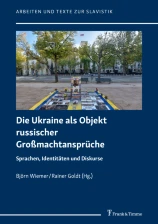In der letzten Zeit sind u.a. diese frei verfügbaren Titel erschienen:
Contributions to Baltic-Slavonic Relations in Literature and Languages – An Interdisciplinary Collection of Essays
Stephan Kessler (Hrsg.)
https://doi.org/10.30819/5497
As much as scholars of Baltic Studies always claim independence for the languages and literature it involves, it is evident that the Baltic and Slavic languages and literature have been and still are in latent contact and exchange. The historical processes had led to interwoven but distinct cultural spheres ‚on the border.‘ Our interdisciplinary collection of essays follows several borderlines:
- Teresa Dalecka (University of Vilnius) discusses the Polish literature in Lithuania since 1990 and the environment that created it.
- Stephan Kessler (University of Greifswald) sketches a framework of narration and applies it to a story written by Maks Fraj who lives in Lithuania but is from Odessa by origin.
- Anna Stankeviča, Inna Dvorecka, and Jekaterina Gusakova (each from the University of Daugavpils) give an overview of Latvia’s Russophone book market and analyse Vadim Vernik’s formula fiction.
- Sergei Kruk (Stradiņš University in Rīga) discusses the Latvian concept of linguistic integration that roots in the romantic notions of social homogeneity and language as being a shibboleth for successful integration.
- Nicole Nau (University of Poznań) highlights four techniques for the integration of Slavic verbs and verbal derivational affixes into Latgalian, based on material from the 19th to the 21st century.
- Anastasija Kostiučenko (University of Greifswald), investigates how the concept of hybridity can be used to describe and better understand the language area and identity issues in Southeast Lithuania.
Stereotypes and myths intertextuality in Central European imagological reflections
Tibor Žilka, Anna Zelenková, Krisztián Benyovszky
https://doi.org/10.3726/b19974
This book combines the theory of intertextuality and intermediality with imagological reflections. These are understood as a way of intercultural, hermeneutically oriented secondary communication in which the analyses of „otherness“ do not serve for the purposes of presenting one’s own self, but for understanding it. By providing tangible text examples from Central European literatures (and others), the authors focus on the circulation of „culture images“ as a multilayer text, where reality is represented through verbal means and interpretational proceedings. These images emerged primarily in the period of rising nationalism and, to some extent, they persist to this day. The monograph thus opens a new perspective for theoretical analysis of problems.
Die Ukraine als Objekt russischer Großmachtansprüche: Sprachen, Identitäten und Diskurse
Björn Wiemer & Rainer Goldt (Hrsg.)
https://doi.org/10.26530/20.500.12657/86052
This volume brings together contributions on the background to the Russian attack on Ukraine from a (socio-)linguistic, linguistic and literary-historical and political perspective. The emphasis is not on day-to-day political events, but on facts and contexts that have received little attention to date. This reveals gaps in knowledge, misinterpretations and distortions that are deeply rooted not least in Western societies. Here, recognized experts bring together a wealth of background knowledge on the historical and current contexts of the Russian-Ukrainian conflict. In doing so, they help to reduce information deficits and correct misconceptions about the Eastern Slavic linguistic and cultural area.



